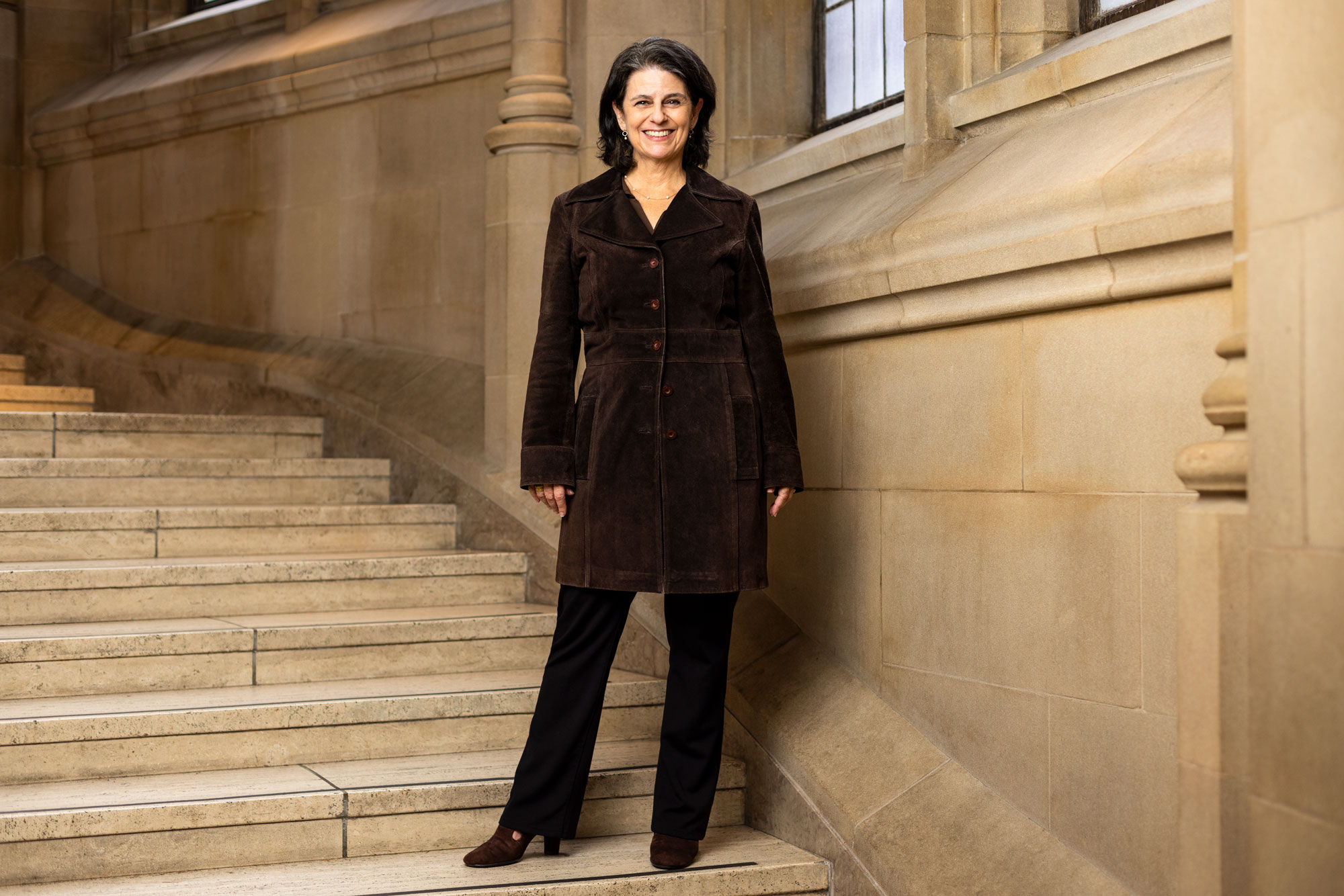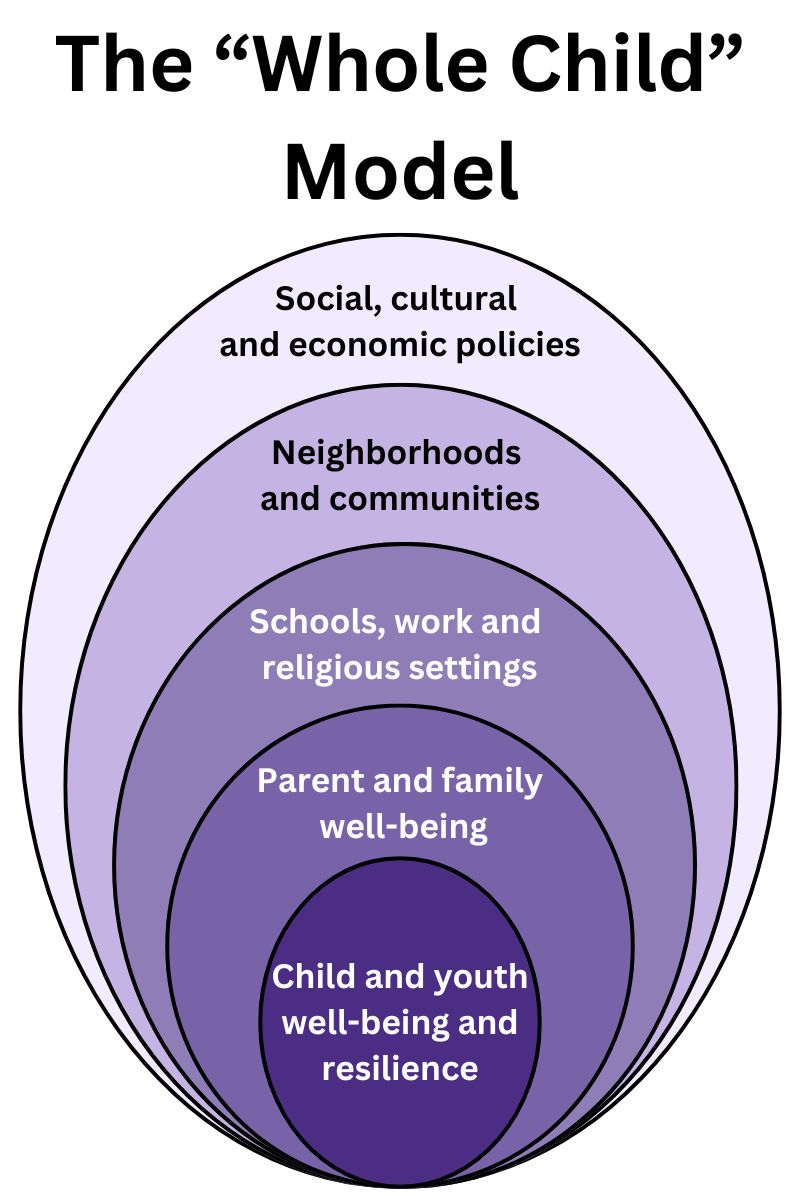Nurturing the whole child Nurturing the whole child Nurturing the whole child
Researchers at the UW Center for Child & Family Well-Being create practical tools to improve mental health for parents, caregivers and young people.
By Malavika Jagannathan | Photos by Dennis Wise | March 2025

As a doula, Taylor Kaminski supports new mothers in a variety of ways—from holding their hands during childbirth to helping them breastfeed their infants. Often she provides a friendly ear, listening to them vent or share their parenting challenges.
“A lot of moms struggle with postpartum depression—and don’t realize they’re going through it,” says Kaminski, who works for Global Perinatal Services, a nonprofit that serves women from low-income, immigrant and refugee families in King and Pierce counties. In addition to screening her clients for depression, she now shares information about meditation, breathing or journaling—mindfulness techniques she learned through the University of Washington’s Center for Child & Family Well-Being (CCFW).
Kaminski is one of over 1,500 community caregiving providers across western Washington who’ve participated in the center’s Resilient Attitudes & Living for Professionals (REAL Pro) program, which combines mindfulness, self-compassion, neuroscience and cognitive-behavioral coping strategies in weekly sessions. The programs were developed by CCFW researchers with support from the Maritz Family Foundation, and a transformative $2.6 million gift from the Ballmer Group will help them train more providers like Kaminski, who can then deliver the programs to their clients.
“We trust that they know and have trusted relationships with their community,” says CCFW founder and director Liliana Lengua, the UW’s Maritz Family Foundation Professor of Psychology. “Being able to train people in organizations already working with families makes those programs more accessible.”
The center’s goal is to help address a global mental health crisis, especially for children and youth. According to the National Alliance on Mental Illness, each year, one in six U.S. youth aged 6–17 experience a mental health disorder. “We’re seeing elevated rates of mental health problems creeping down to younger ages and don’t have nearly enough services to meet that need,” Lengua says. The center’s research-based programs are not a substitute for mental health services, but they give families, caregivers and educators tools to help young people regulate emotions, manage stress and strengthen coping skills.
For nearly three decades, Lengua has been thinking about how best to support children and families facing adversity and stress. In her early years she watched how her own parents, who grew up in or near poverty, dedicated themselves to improving her and her sister’s lives. Understanding how parental stress and hardship affect a child’s development initially drew her into the field—and eventually brought her to the UW, where she’s spent her entire career so far.
 Lengua’s research—and the center’s work—is built around a “whole child” framework that considers the many interdependent factors that shape a child’s behavioral, social and physical health. “We’re not just thinking about the impact parents have on children but about these more complex systems and structures surrounding families,” she says. The program looks at schools, neighborhoods and communities, and how they in turn are affected by broader social and political forces. This nested approach considers the child within the context of everything around them.
Lengua’s research—and the center’s work—is built around a “whole child” framework that considers the many interdependent factors that shape a child’s behavioral, social and physical health. “We’re not just thinking about the impact parents have on children but about these more complex systems and structures surrounding families,” she says. The program looks at schools, neighborhoods and communities, and how they in turn are affected by broader social and political forces. This nested approach considers the child within the context of everything around them.
Lengua created the Center for Child & Family Well-Being in 2011, bringing together UW researchers from across disciplines who were all working on children’s mental health and family well-being. She aimed to speed up delivering research-based information and interventions to the broader community: Typically, it takes 15–20 years for research to make it into practice. Lengua wanted to close that gap.
Today the center accomplishes that in a variety of ways, including public lectures, professional workshops, online resources and facilitated well-being programs for audiences from parents of infants and preschool-age children to college students and academic staff and faculty. (Be REAL, a six-week well-being program for college students, was first implemented at the UW and has since expanded to other universities.) All these programs combine best practices from mindfulness, neuroscience, psychology and self-compassion. A trained facilitator guides participants through skill-based lessons, discussion, activities and contemplative practices like meditation or journaling. The content is easily digestible, adaptable and relevant.
The relevance struck Yael Tellez-Rodriguez when she attended her first Be REAL facilitation training in 2023. She’d signed up in her role at Rainier Scholars, where she supports Seattle families of college-bound students. But as a new mom, Tellez-Rodriguez found useful takeaways for her own life—such as taking a five-minute pause in her day to focus on herself. It improved her well-being so much that she decided to offer a version of Be REAL to the parents she works with.
The center’s parent-focused programs show a positive impact on both the parents and children.
It was an instant success. The parents were happy to connect with each other—and “thankful to be equipped with skills they could use moving forward,” Tellez-Rodriguez recalls. She later hosted a second cohort of parents over Zoom, this time offering it entirely in Spanish.
Preliminary studies by CCFW researchers show that the programs are working. For example, the parent-focused programs—implemented by early-learning centers, doulas and community partners across the Puget Sound—show a positive impact on both the parents and children. Parents learn how to validate their children’s feelings, manage their own stress and balance autonomy and structure for their kids. “Parents tell us they feel like better parents,” Lengua says, “and the mindfulness practices help them with their own emotions and well-being.”
The Ballmer Group funding will help the center expand and evaluate its “train the trainer” model. This not only broadens the reach of the prevention programs, but also tests whether they’re as effective when delivered by community partners. CCFW researchers also plan to create online asynchronous versions of the programs that are easier for participants to access on their own schedules.
More funding would allow center researchers to expand training opportunities, evaluate online resources, and follow up with parents and children after a year or longer, Lengua says. “We want to see a lasting impact on parents, so that we see it in children’s developmental outcomes down the line.”